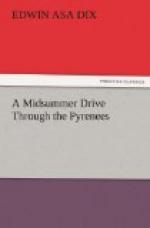“‘I will not,’ replied he, ‘until I have told thee some news.’
“The knight’s lady was so much frightened, the hairs of her head stood on end and she hid herself under the bed-clothes.
“‘Well,’ said the knight, ‘and what news hast thou brought me?’
“The spirit replied, ’I am come from England, Hungary or some other place, which I left yesterday, and such and such things have happened.’
“Thus did the Lord de Corasse know by means of this messenger all things that were passing in the different parts of the world;” and for years this invisible mediaeval sprite kept his patron comfortably posted on all current events, in a ghostly adumbration of the modern newspaper press.
But Coarraze and its castle carry us on later than Froissart’s days. Here young Prince Henry ran about in his hardy youth, and romped and played pranks on his future subjects. Nothing delighted him more in after life than to come back here and hunt up his old peasant playfellows, bashful and reluctant, and bewilder and charm them with his state and his bonhomie. Most of the old castle is gone now, destroyed by a storm and since replaced by a newer structure. The old baron’s spirit-messenger or the “white lady” of the House of Navarre have only the single tower remaining, for their ghostly visits,—finding change over all save the far line of the Pyrenees glittering unearthly in the moonlight.
CHAPTER IX.
THE WARM WATERS AND THE PEAK OF THE SOUTH.
“And we who love
this land call it a paradis terrestre, because
life is fair in its
happy sunshine,—it is beautiful, it is
plentiful, it is at
peace.”—The Sun Maid.
It is a nineteenth-century sun that wakes us, after all, each morning, through the Gassion’s broad windows. We can reconjure foregoing eras, but we do not have to live in them. The hat has outlawed the helmet; the clear call of the locomotive is unmistakably modern. Throughout Pau, in its life, its people, its social rubrics; in its streets, shops, hotels,—the thought is for the present age exclusively. The past is appraised chiefly at what it can do for the present. Business and society pursuits are not perceptibly saddened by memories of the bear-hunt at Rion or the dagger of Ravaillac.
And thus we come into the instant year once more, as we take the mid-morning train from Pau. We point straight for the mountains. We are on the way to Eaux Chaudes and Eaux Bonnes, before mentioned as a fourth excursion from Pau; but we go not as an excursion merely, for they lie directly in our farther route. These resorts, the repute of whose springs we hear in advance, are south from Pau about twenty-eight miles; twenty-five are now covered by the new railway, and the remaining three are done by the diligence or by breack,—for the latter of which, we telegraph.




